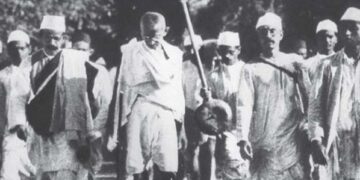MJ Akbar
IF you have to define freedom, you probably do not have it. Freedom lives in the air. It is a spirit, not a script. Freedom is what we breathe, what we feel, an elixir not a palliative; a fundamental pillar of modernity in the 21st century. It is a human right with just one corrosive enemy: human nature when it degenerates into excess, and, therefore, like any precious asset, must be constantly and consistently protected by common sense. Freedom is the guardian of the mind. It holds the head high. Our national poet Rabindranath Tagore wanted the British colonial masters to see that head held high, the better to read the Indian mind. Dictators prefer their subjects to live with downcast eyes.
Few societies take more joy in freedom than contemporary India, but we did not get here by accident. If Rabindranath Tagore was the prophet, then Mohandas K Gandhi was the architect and designer of freedom. His first national mass movement, Non-Cooperation between 1920 and February 1922, was perhaps his finest achievement for it liberated Indians from fear, a necessary prelude to liberating India from British colonialism. Without 1920, there could be no 1947. In 1931, Gandhi drafted the charter of freedom for the Karachi Congress which evolved into the fundamental principles of free India’s Constitution, adopted in 1950.
Universal franchise
Adult franchise is the heartbeat of freedom. Countries which describe themselves as older democracies gave universal franchise to their people in stages, because they did not believe that every citizen was equal. Britain till the third decade of the 20th century was a flatulent oligarchy with democratic characteristics rather than a democracy since women were allowed to vote only in 1928. French women possessed the right from the revolutionary era of 1791, but had to wait for a mere 157 years before they were proffered a ballot box. There were no ifs and buts, no alibis, in free India. Every Indian had equal rights from the first election of 1952, despite unwanted sermons by colonial supremacists like the all weather Winston Churchill who thought that illiteracy and poverty made the Indian masses incapable of free choice. That did not make Indians unintelligent. Churchill predicted chaos. The Indian people ensured stability.
Democracy is elections. But elections alone are not democracy. Elections are an illusion when they cannot change a government if that is what the people want. Many authoritarians use mechanisms to steal the result, creating a political vacuum. Political nature, like nature, abhors a vacuum.
Bangladesh polls
Bangladesh had general elections in January this year. Passions would not have turned volcanic if the active Opposition had contested and won whatever seats it could, perhaps even a majority. The legitimacy of any democratic government is directly proportional to the credibility of the election. Both Bangladesh and India had general elections this year. There was no tension in Dhaka when the January results reached the newsrooms because they were seen as a foregone conclusion. In Delhi, the voter chastised the Government to the precise extent it wanted, bolstered the Opposition, destroyed the pretensions of opinion polls and nourished once again the roots of Indian democracy Both Government and Opposition accepted new facts and got on with the arduous business of governance
through legislature and executive. Democracy is a shield against the hiccups of history, ensuring peaceful transition and continued coexistence of different ideas within a framework designed by free will. In Bangladesh, Sheikh Hasina became the queen of spades, using a bludgeon where a scalpel would have served. The combination of fatigue, familiarity and the inescapable aspirations of a generation that was not born when she first became Prime Minister, and five years old at the start of her current spell in office, coalesced into a tornado that eventually whipped up as much poison into the air as it sought to clear.
As I write, stories of death, arson and communal terror continue to pour in; but hopefully the new authorities will soon restore the secular spirit of the Bangladeshi people. Neither the Army nor any interim administration can be democratic. They are crisis managers, a palliative, not an answer. The only way forward is another election.
















